|
If your group, church, book club, office or organization is looking for an important cause, we have a well-supported, short-term initiative that makes a real difference in our community!
We have a support packages with information kits, bookmarks, thank you cards and certificates ready to be part of your fundraising efforts. Click here for more information. Call 451-2120 or email: [email protected] or [email protected]to get involved.
0 Comments
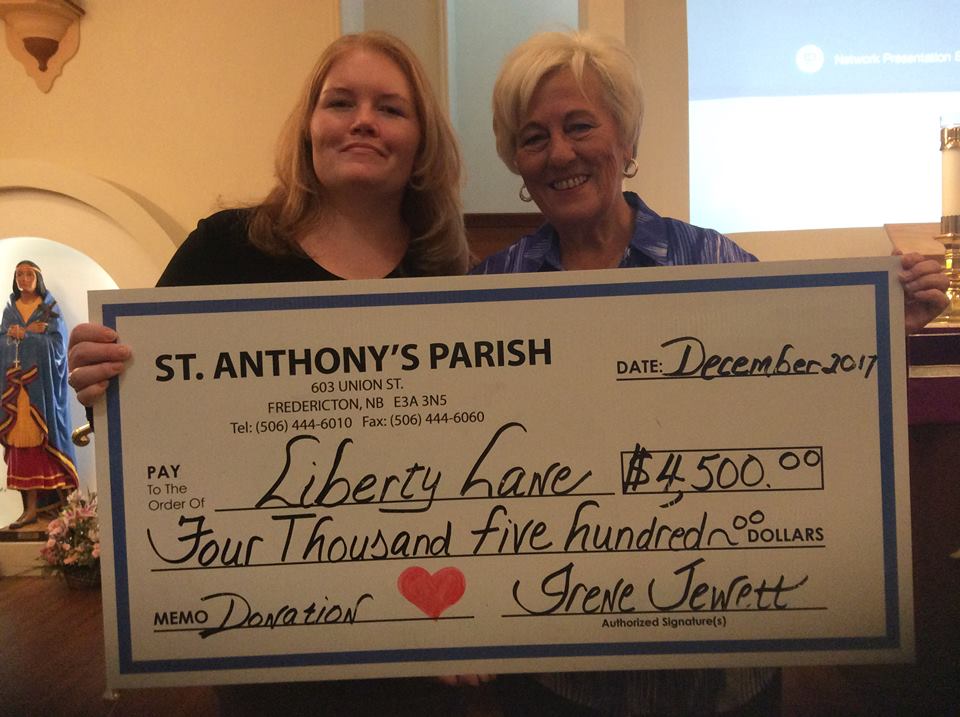 Standing on a stage specially built by her brother Dan on the altar of St. Anthony's Catholic Church in Devon, Irene Jewett looks out on the crowd of country music fans sitting in the church pews. The fans and performers are there to take part in what has become a regular event at St. Anthon’s — a country and gospel benefit concert to help the families affected by family violence. Irene has just received the total of the money raised during the concert. As the crowd waits in anticipation, Irene's smile beams in the light of the church's stained glass windows. This show has raised $4,000 taking the total for the series of concerts over the $33,000 mark (the total to date has climbed to $38,000.) It was at the 2016 Christmas Show, that Irene announces passing the $30,000 milestone, Fr. Monte Peters drops 30 inflated balloons from the church balcony onto the cheering crowd. It was a special moment for Irene, a culmination of many special moments since Irene has been the organizer and force behind this concert series. Five years ago, a woman with four young children was leaving her abusive partner and asked Irene for help. "She had nowhere to go," says Irene. "She needed a couple nights in a hotel to get organized. She was desperate." The plight of this young family really affected Irene. "I would see the face of her five-year-old son when I tried to sleep. I asked Fr. Peters, 'What are we going to do to help this family?' He told me, 'Irene, you'll figure it out. Let me know what you need me to do."' Irene and the parish were able to raise enough money to help the woman and her kids. The situation made a big impact on Irene. "It felt good to help out this family but I knew that I couldn't keep doing that with individuals. I've had friends who were in bad relationships and used some of the services at Liberty Lane, so I decided to make Liberty Lane the main beneficiary of anything that I decided to organize." Irene has a long time love of music and performing and she decided to take that love and turn it into a fundraiser for the women and children facing abuse. Since she began organizing the country and gospel concerts five years ago, she has had 91 entertainers from all over the Maritimes and the eastern United States take part. Her love for her audience is also a factor in organizing the shows. Early in the concert series, the shows started in the evening and finished when it was dark. One night a patron hit a moose driving home from one of the shows. Irene decided that she would move future shows to the afternoon to make sure everyone could get home safely. She also insists on only using local musicians during the winter months to avoid people driving too far in snowy conditions. "So many people give so generously to make these concerts happen," says Irene. "We have a great group of volunteers and It really is quite something that St. Anthonys lets us use the church like we do. I don't think anything like this has ever been done in a local Catholic church." Local organizations have recognized the good works Irene has been doing. She has received the Beta SigmaPhi Woman of the Year Award, the Judy Loukes Award from Liberty Lane, and The Muriel McQueen Fergusson Foundation Award to recognize outstanding contributions toward preventing and eliminating family violence in Canada. All of the money raised is from "free will offering." The most she has ever received in an individual offering was $200. Irene spoke to the donor after the concert to thank her. The woman had been in an abusive relationship and was motivated to give back now that she could. Irene has set a goal of $50,000 for the concert series. They are a great deal of work but she loves the music and the audience and has an enormous sense of pride in the concert series and the good works they make possible. "Everyone gives so generously for this cause," says Irene. "I can't wait to reach our goal. It's going to be fantastic." 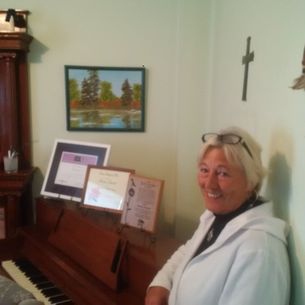 Irene stands in front of the awards she has received including the Beta SigmaPhi Woman of the Year Award, the Judy Loukes Award from Liberty Lane, and The Muriel McQueen Fergusson Foundation Award to recognize outstanding contributions toward preventing and eliminating family violence in Canada.  Once again George Street Middle School pulled together an amazing amount of donations for Liberty Lane. Toilet Paper, Dish Soap, Juice Boxes, Cleaning Products, Coffee, Tissue Paper, and on and on!! We couldn't have transported all the items without the help of two Hyundai trucks and six of the Hyundai employees! Thank you to our generous community, Hyundai Fredericton, and George Street Middle School! Policy and Legislation to Assist Victims of Family Violence in the Workplace: A Student Blog Post12/14/2017  For a victim of intimate partner violence, maintaining employment can be incredibly challenging. IPV comes with a series of added pressures and time commitments that may require victims to miss work or need direct changes to their work environment or schedule. Unfortunately, this can also place them at great risk of losing their job during what is already a stressful and dangerous time. Currently in Canada, there is no nation-wide, policy-based protection surrounding employment security for people experiencing IPV. However, in recent years, a push for change has begun across several provinces, including New Brunswick, that employers should be aware of! Here is a quick look at some of the changes happening across Canada, what is being proposed in New Brunswick, our recommendations surrounding this policy, and what you specifically can do to both support this legislation and any employees in your life who may be affected by IPV. Existing Legislation Across Canada: In Canada, Manitoba was the first province to propose and enact legislation that provides workplace leave for victims of domestic and intimate partner violence (Bielski, 2017). Bill 8 (2015), The Employment Standards Code Amendment Act (Leave for Victims of Domestic Violence, Leave for Serious Injury or Illness and Extension of Compassionate Care Leave) was put forward by NDP member Honourable Ms Braun, the Minister of Labour and Immigration in Manitoba, and assented to on March 15, 2016 (Allen & Hughes, 2016; Bielski, 2017). This legislation allows for employees who are victims of domestic violence to take a leave of five paid days, five unpaid days, and an additional 17 unpaid weeks (Bielski, 2017). To access this leave, an employee must be a victim of domestic violence, as defined by the Domestic Violence and Stalking Act (Allen & Hughes, 2016). This act defines domestic violence as the following: [An] intentional, reckless or threatened act or omission that causes bodily harm or property damage; an intentional, reckless or threatened act or omission that causes a reasonable fear of bodily harm or property damage; conduct that reasonably, in all the circumstances, constitutes psychological or emotional abuse; forced confinement; sexual abuse (The Domestic Violence and Stalking Act, 2016, s. 2(1.1)(a-e)). An employee is eligible for this leave after working for the same employer for ninety consecutive days (Bill 8, 2015). This leave can be used to seek medical attention for an employee or their child, to access victim services, to attend professional counselling, to facilitate relocation, to seek legal or law enforcement help, or for any other required services (Bill 8, 2015). Employees who wish to use this leave must give notice, as early as possible; furthermore, the leave must be continuous (Bill 8, 2015). All employers are required to provide reasonable accommodations for victims of domestic violence (Allen & Hughes, 2016); however, they are also entitled to “reasonable verification” of the need for leave (Bill 8, 2015). The definition of reasonable verification has not been specified (Allen & Hughes, 2016). Similarly, Ontario has proposed new legislation for domestic violence leave. Bill 26 (2016): An Act to amend the Employment Standards Act, 2000 in respect of leave and accommodation for victims of domestic or sexual violence and to amend the Occupational Health and Safety Act in Respect of Information and Instruction Concerning Domestic and Sexual Violence was put forward by NDP member, and women’s issues critic, Peggy Sattler (Bielski, 2017). This legislation will be enacted on January 1, 2018 (Government of Ontario, 2017a). This legislation will allow employees to take a leave of ten paid days, with an additional 15 unpaid weeks, in a calendar year (Government of Ontario, 2017a). An employee can use this leave if they have been a victim of domestic or sexual violence, or if their child has been a victim of domestic or sexual violence (Bill 26, 2016). After being employed for thirteen consecutive weeks, an employee is eligible for this leave (Government of Ontario, 2017a). The ten days can be taken at any time, together or sporadically, including partial days; however, an employer can deduct a full day, even if only part of a day has been used (Government of Ontario, 2017b). The leave can be taken to seek medical attention for oneself or a child for physical or psychological injury related to the abuse, to access victim services, to attend psychological (or other) counselling, to facilitate relocation or to pursue legal and/or law enforcement assistance (Government of Ontario, 2017b). Similar to Manitoba, an employee must give as early as reasonable notice to take the leave, and the employer is entitled to reasonable verification of the need for the leave (Government of Ontario, 2017b). Looking Closer to Home: NB’s Proposed Legislation: Here in NB, the New Brunswick Union has recently been pushing for a change in our own legislation to create change and build upon the aforementioned progress made in other parts of Canada. They have proposed an amendment in the provincial Employment Standards Act with the goal of allowing survivors to be able to have the flexibility and time to seek help or tend to their needs while still maintaining their financial security. Ensuring financial security is especially important for survivors of IPV, particularly those who are in the process of leaving; due to the incurrent costs and potential loss of a partner’s income, many survivors identify financial concerns as being a major barrier from leaving an abusive partner. This legislation, by offering increased economic security to survivors, would directly lessen the impact of this barrier and provide victims with a tool to help break the cycle of abuse. The NBU’s main proposed change in this legislation would allow victims of IPV, or whose children have experienced domestic or sexual violence, to be entitled to a leave of absence to improve their situation without being at risk of losing their job (New Brunswick Union, 2017). This leave would consist of up to ten days, five paid and five unpaid, that could be used either consecutively or intermittently depending on what is needed by the employee (New Brunswick Union, 2017). This time could be used for a variety of reasons, be it for the employee to move, access IPV-related services or aids, attend court or meetings with a lawyer, visit a doctor, tend to physical injuries, and more. Just recently, CUPE NB has announced a push for similar legislation (Canadian Union of Public Employees, 2016). Offering a leave of absence is not the only role of this proposed legislation change, however. This legislation would additionally offer protection to victims by requiring their employers to accommodate reasonable changes while the victims are at work, as well. For example, this could include having an employer adapt an employee's hours or place of work in order to prevent undue hardship to the victim (New Brunswick Union, 2017). Having these direct supports for victims in place will assist in ensuring both their physical safety and mental health, while also offering direct suggestions of plans for action by employers so that they are able to help their employee while also helping themselves by maintaining workplace productivity. The NBU has already made some progress with this proposed legislation, though there is still much to be done. They have begun by looking at individual contracts, ensuring that language surrounding domestic violence leave is included in the Union’s own new collective agreement, and negotiating similar language into contracts for two different nursing homes in the province (New Brunswick Union, 2017). In terms of changing legislation itself at a government level, the NBU has been meeting with representatives for various levels government and pushing to have this proposed change supported and brought forth as a motion in a legislative assembly (A. McGilligan, personal communication, 2017). However, thus far this has not occured. Our Recommendations: In light of the fact this policy change has not yet been proposed or implemented, there is a lot that you as a reader can do. Our recommendation to readers and employers is to become more educated with the barriers faced by those who have experienced family violence and advocate for those who have been impacted by IPV by supporting the legislation change; this will give those living with IPV more workplace flexibility to allow them to seek the help and resources they need without the risk of losing employment. This legislation would also consist of five paid and five unpaid days off from work. Another way to take action supporting individuals who have experienced IPV is to incorporate domestic violence leave into your own business contracts. If these are things that you do not have the power to change, simply sharing this blog or previous blogs, or even by sharing relevant articles such as the 2016 CBC News article by Dylan Hackett, “ New Brunswick Union wants paid leave for domestic abuse victims,” is a great first step towards creating awareness of the issue and advocating for change. We also believe that while these suggested policy changes are wonderful, there are areas that could be strengthened to offer greater protection and support to the individuals affected. Our first recommendation for the new legislation is to be inclusive and consider all forms of DV/IPV. When thinking of DV/IPV, we often think of physical violence only, but it is important to include emotional, financial, sexual, and spiritual abuse as well when re-working the legislation. We also recommend that employees should have a full ten days, rather than five paid days off of full wage pay. Many individuals who are escaping family violence struggle financially already, so reducing their pay would be creating another barrier for the individual trying to leave an abusive partner. Finally, our last recommendation for the new legislation and for employers is to ensure that the time taken off of work for DV/IPV reasons is exact, and to not deduct a full day when one only takes a half day. For more information on this subject, contact the New Brunswick Union or Liberty Lane! By Lacie Hardy, Ally Loiselle, and Kathleen Chiasson References Allen, K., & Hughes, A. (2016). Manitoba Employment Standards legislation to include leave for victims of domestic violence. Lawson & Lundell Labour and Employment Law Bulletin. Retrieved from https://www.lawsonlundell.com/media/news/519_L_E%20Bulletin%20-%20Client%20Brief%20Manitoba%20Domestic%20Violence%20Law.pdf Bielski, Z. (2017, March 24). Manitoba passes law to offer victims of domestic violence leave from work. The Globe and Mail. Retrieved from https://www.theglobeandmail.com/news/national/manitoba-approves-bill-to-offer-victims-of-domestic-violence-leave-from-work/article29255554/ Bill 26: An Act to amend the Employment Standards Act, 2000 in respect of leave and accommodation for victims of domestic or sexual violence and to amend the Occupational Health and Safety Act in Respect of Information and Instruction Concerning Domestic and Sexual Violence. (2016). 2nd Reading Oct. 20, 2016, 41st Legislature, 2nd Session. Retrieved from the Legislative Assembly of Ontario website: http://www.ontla.on.ca/bills/bills-files/41_Parliament/Session2/b026.pdf Bill 8: The employment standards code amendment act (leave for victims of domestic violence, leave for injury or illness and extension of compassionate care leave. (2015). 40th Legislature, 5th session. Retrieved from the Legislative Assembly of Manitoba website: https://web2.gov.mb.ca/bills/40-5/pdf/b008.pdf Canadian Union of Public Employees (2017). CUPE NB makes inroads to assist victims of intimate partner violence. Retrieved from https://cupe.ca/cupe-nb-makes-inroads-assist-victims-intimate-partner-violence Government of Ontario, Ministry of Labour. (2017a). Ontario expanding worker protections for victims of domestic or sexual violence: Ontario proposes expanded job-protected leave. Retrieved from https://news.ontario.ca/mol/en/2017/10/ontario-expanding-worker-protections-for-victims-of-domestic-or-sexual-violence.html Government of Ontario, Ministry of Labour. (2017b). Ontario’s proposed domestic or sexual violence workplace leave. Retrieved from https://news.ontario.ca/mol/en/2017/10/ontarios-proposed-domestic-or-sexual-violence-workplace-leave.html Hackett, D. (2016). New Brunswick Union paid leave for domestic abuse victims: The New Brunswick Union wants the province to implement paid leave for those fleeing domestic abuse. CBC News. Retrieved from: http://www.cbc.ca/news/canada/new-brunswick/abuse-victims-paid-leave-nb-1.3505859 New Brunswick Union (2017). Domestic violence leave legislation: New Brunswick Union Communications 2017 [Powerpoint slides]. Provided by A. McGilligan, 2017. The Domestic Violence and Stalking Act [2016, c.3]. Retrieved from the Legislative Assembly of Manitoba website: http://web2.gov.mb.ca/laws/statutes/ccsm/_pdf.php?cap=d93 Giant Tiger provides and wraps gifts for the women and children at Liberty Lane. Thanks to all the volunteers who helped. Tammy Paul, Tracy Culliton, Kelsey Schroeder, Kali Schroeder, Chandler Gallant, Maddie Ingraham, Becky, Katie, Jackson, Rhonda, Bella.
 Joan Kenny is a well-recognized and respected community leader in Fredericton. She has a background in teaching, administration and a wealth of volunteer experience. Joan is often called upon as a resource to coordinate and plan community fundraisers and special events. Put plainly, she knows how to make things happen. Her conviction and determination provide a focus not often duplicated. Liberty Lane has been fortunate to have Joan serve as our Patron during our expansion and relocation. Joan has worked with Liberty Lane throughout our move and expansion. She has been a significant resource in getting the building started, completed; and open for the clients who need our services and support. Joan has served on Saint Thomas University’s Board of Governors, been a director with a national literacy training organization, and served on the Board of Directors for the King’s Landing Historical Settlement. Joan is well known for both caring about and supporting her community. Both Joan and her late husband, Bob, have been long-time supporters of Liberty Lane and have a deep connection to our new facility. Because of this longstanding support, Liberty Lane is honoured to have Joan Kenny as our Patron and to recognize this support we are naming our new facility Kenny House.  Impact of IPV on the Workplace: As you may have seen in our last blog post, survivors of intimate partner violence experience many barriers to finding and seeking employment. It is important, therefore, for the workplace itself to have an idea of how to respond to and work with an employee who may be experiencing these obstacles, be you an employer, a supervisor, or simply a fellow coworker! Even though the abuse may only be conducted within the home, effects of the violence can frequently be seen in the workplace of many survivors. Costs to employers related to IPV can be as high as five million dollars, taking into consideration things like absenteeism, employee turnover, and loss of productivity (Katula, 2012). A study by Samuel et al. (2011) found that survivors of IPV reported that declines in their work performance “ranged from no effect at all to significant impairments,” with tardiness and absences being the most common effect (p. 252). The participants additionally mentioned that they felt their work relationships also suffered due to the stigma and secrecy surrounding IPV (Samuel et al., 2011). This isolation is sometimes furthered by the fact that survivors may not be able to participate in team building activities within the workplace due to physical injury, bruises, or simply not feeling comfortable enough (Alsaker, Moen, Baste, & Morken, 2016, p. 483). In light of this, survivors may not feel comfortable disclosing to their supervisors or fellow employees, leaving the cause of the decline in work quality shrouded in mystery. Workplaces may not know what is going on or how to respond. Therefore, as Alsaker et al. (2016) writes, “Employers and co-workers need to know that negative incidents at work may be a result of IPV” (p. 486). An employer should consider how perpetrator actions can impact victims before, during, and after work hours (Keim, Strauser & Olguin, 2009). Employers should be conscious that a decline in work performance, especially when accompanied with tardiness and absence, could be a sign of intimate partner violence and offer supports accordingly to their employees, be this by referring them to services outside of work or simply making accommodations for necessary lost hours or productivity. However, many supervisors report feeling uncomfortable broaching this subject with their employees or are unsure of how to do so. For example, supervisors may be worried that asking an employee about whether or not they are an IPV survivor could be construed as harassment or an invasion of privacy, particularly if the supervisor is male (Samuel et al., 2011). They may also be wary due to language or cultural differences, being unsure of resources or how to offer aid, or even feeling worried that they “would bear responsibility for any advice offered to the employee if the employee's situation should worsen” (Samuel et al., 2011, p. 254). What is Currently Being Done: The good news is that this concern generally comes from a good place and, while wary, employers are generally willing to work with the survivor to ensure they still have a place at the workplace; employers “stressed the importance of keeping the employee on the job, even if she needed extended time off or if her performance had declined” (Samuel et al., 2011, p. 255). This is very important, as to many survivors “work represent[s] survival and recovery through freedom from violence and contact with others who cared for them, and this [is] important for the maintenance of self-esteem and self-confidence” (Alsaker et al., 2016, p. 485). As one survivor, Susan, reports, “[F]or me it has been so incredibly important to go to work, because out there in working life we are worth something. So maybe that is why I survived and didn’t throw myself off the balcony, because I experienced so much acceptance at work” (Alasker et. al, 2016, p. 482). However, it is not only the social systems and supports found at the workplace that make finding or maintaining employment essential; having a steady income also provides survivors with greater economic independence, therefore opening them up to wider opportunities and courses of action (Alsaker et al., 2016). Therefore, work offers not only a form of escape and support, but also “function[s] as a social insurance and empower clients in IPV situations to be financially independent from the abusive partner” (Alasker et al., 2016,p. 486). When workplaces find ways to keep survivors in their jobs, the survivor is able to have a form of escape from their partner that also offers them a degree of independence. Recommendations for Better Practices: While workplaces do tend to see the importance of keeping a survivor in her position, there is still far more that can be done in workplaces to make them a safer space for disclosure and healing. Here are three main takeaways that employers and supervisors should keep in mind when working with a survivor: First of all, workplaces should have work-based resources surrounding IPV, specifically tools surrounding how to discuss IPV sensitively and legally, as per the concerns raised by many supervisors previously (Samuel et al., 2011). Being prepared and having even simple suggestions of conversation starters to open a dialogue around this subject can go a long way in allowing employers and survivors alike to feel safer when broaching this often difficult topic. Additionally, there is a need for the creation of policy surrounding IPV in the workplace, which can optimize feelings of safety and increase employee productivity (Keim, Strauser & Olguin, 2009). A safe workplace can offer employees the opportunity to be challenged and to grow (Katula, 2012). An IPV policy or program can help mitigate negative impacts experienced by victims and coworkers such as fear, nervousness, chronic ailments or changes in behaviour. Formal support in the workplace can include flexible work arrangements, access to counselling, job relocation, providing education regarding what abuse looks like as well as safety planning (Katula, 2012). Steps to creating an IPV program/policy would involve identifying existing resources for promotion and development, creating an IPV position or policy informed by stakeholders, identifying how policy will be enforced, and developing training for staff related to IPV signs and symptoms, responses, interventions and safety (Katula, 2012). Some supervisors would like to see this done on a corporate or governmental level (Samuel et al., 2011); in fact, there is currently a push by the NB Labour Union for legislation to be implemented province-wide that offers supports and time off (both paid and unpaid) for survivors who may need time to move, visit their doctor or lawyer, and so on (New Brunswick Union, 2016). Other supervisors would simply prefer “open door policies” rather than such formal approaches (Samuel et al., 2011). Finally, many supervisors in various workplaces believe that “having a list of community resources for referral would be useful and important,” particularly those related to crisis centres or legal aid, so that they might direct their employee to resources outside of the office if necessary and desired (Samuel et al., 2011, p. 256). In addition to helping an employee feel safe and cared for within the workplace, this puts them in touch with additional supports they are able to access should they chose to seek aid outside of the office. In Conclusion … While we acknowledge that a variety of institutional and organizational barriers exist when considering implementing an IPV program or policy (such as a lack of funding and personal resources, an insufficient relationship between the employer and the IPV sector, and a shortage of knowledge about the topic which may translate to a lack of interest) (Katula, 2012),the implementation of an IPV policy or program would produce many benefits to victims and employees; this includes increased self-esteem, improved finances, greater social connections, and even maybe fostering a sense of motivation and purpose (Katula, 2012). At the very least, an organization must be willing to collaborate with victims and assure that they will not be condemned for seeking support (Katula, 2012). A little can go a long way! Liberty Lane is currently in the process of creating tools to help employers address intimate partner violence in the workplace. For more information on what you can do, feel free to contact us at (506) 451-2120. By Lacie Hardy, Ally Loiselle, and Kathleen Chiasson Links to Articles: Alsaker, K., Moen, B. E., Baste, V., & Morken, T. (2016). How has living with intimate partner violence affected the work situation? A qualitative study among abused women in Norway. Journal of Family Violence, 31(4), 479-487. Retrieved on October 24, 2017. (See PDF below.) Katula, S.L. (2012). Creating a safe haven for employees who are victims of domestic violence. Nursing Forum, 47(4), 217-225 (See PDF below.) Keim, J., Strauser, D.R., & Olguin, D.L. (2009). Enhancing employment outcomes for survivors of intimate partner violence: A developmental work personality perspective. Journal of Employment Counseling, 46(3), 136-144. (See PDF below.) New Brunswick Union. (2016). Legislation would help victims of domestic violence. Retrieved from http://www.nbu.ca/index.php?option=com_k2&view=item&id=3453:legislation-would-help-victims-of-domestic-violence&Itemid=136&lang=en Samuel, L. J., Tudor, C., Weinstein, M., Moss, H., & Glass, N. (2011). Employers' perceptions of intimate partner violence among a diverse workforce. Safety and Health at Work 2(3), 250-259. doi: 10.5491/SHAW.2011.2.3.250. Retrieved on October 24, 2017. (See PDF below.)
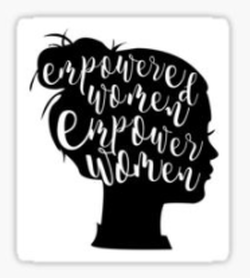 Intimate partner violence, or “IPV,” is defined by the World Health Organization (2012) as “any behaviour within an intimate relationship that causes physical, psychological or sexual harm to those in the relationship”(p. 1). Numerous pieces have been written on the lasting effects this kind of abuse can have on a person - especially emotionally, psychologically, and physically - but one effect that is explored far less frequently is the effect on a survivor’s economic independence and their ability to find, or keep, a job, both while currently living in an abusive home and after leaving. During our time at Liberty Lane thus far, we have been exploring these effects and the barriers that exist for IPV survivors seeking employment, and we have compiled our findings for you below! First of all, survivors of IPV may have been unable to maintain employment while suffering abuse, or they may have worked as homemakers; therefore, they may lack the necessary education or work experience required to obtain many positions (Keim, Strauser & Olguin, 2009). Employment empowers women through maintaining financial security and stability, increasing self-esteem and feelings of safety, and facilitating motivation and a sense of purpose in their lives (Keim, Strauser & Olguin, 2009). Economic self-sufficiency can be defined as being able to provide for oneself with little assistance (Interval House, 2016). Employability refers to being physically, emotionally, intellectually and psychology ready and able to be employed and having the skills to obtain and maintain employment and life stability (Interval House, 2016). There are a wide variety of barriers to employment that female survivors of IPV experience, which include the following: lack of housing, psycho-emotional issues, lack of documentation or personal identification, lack of food and clothing, a lack of child care or experiencing child-related issues and more (Interval House, 2016). Each woman experiences barriers uniquely, and when multiple barriers exist, they can exacerbate each other (Interval House, 2016). Conversely, confronting one barrier can alleviate others (Interval House, 2016). Barriers to employment impact women differently; this can depend on personal circumstances including age, education level, socioeconomic status, and geographic location (Interval House, 2016). Barriers can occur systemically through political trends or influence and institutional policy (Interval House, 2016). Barriers to employment and employability can be also be psychosocial including things like low self-esteem and experiences of stress (Interval House, 2016). For survivors who are able to work, on-the job harassment by abusive partners, workplace time reduction, and job loss are all consequences in which women suffering from IPV face while working (Showalter, 2016). These are identified as non-physical violence which includes, mental, emotional, financial abuse, as well as stalking (Showalter, 2016). Non-physical violence acts as a disruption to women in the workplace causing them to not perform to their full capacity. As Showalter (2016) writes, “In one study of women who experienced domestic violence, 61,4% of employed women were harassed on the phone at work and 39.2% were harassed in person” (p. 40). Another study by Tolman and Wang (2005) found that women who are victims of domestic violence “missed 137 hours of work per year or a 10% reduction in hours compared with women who have not experienced domestic violence” (Showalter, 2016, p.44). This is while keeping in mind that many of these women work low-wage jobs. Job loss and unemployment is another non-physical violent consequence experienced by IPV survivors (Showalter, 2016). In a study by Shepard and Pence (1988), it was found that 24% of female victims of domestic violence reported using their job due to the abuse they were suffering from (Showalter, 2016). Survivors of IPV may also experience mental health issues like anxiety, depression, or post-traumatic stress disorder (Keim, Strauser & Olguin, 2009). This can also play a role in limiting a survivor’s ability to find or maintain employment. A study by Adams et al. (2013) explored how IPV’s detrimental effects on a survivor’s mental health can impact their job stability. The study found that intimate partner violence “had a significant detrimental impact on women’s job stability for up to 3 years after the abuse had ended” (Adams et al., 2013, p. 605). Depression in particular was found to negatively impact a survivor’s job stability, suggesting a need for survivors to have better access to mental health supports, as well as a need “to investigate the dynamic, reciprocal relationship between job stability and mental health for IPV survivors” (Adams et al., 2013, p. 606). Overall, survivors of IPV experience many barriers to both finding and maintaining employment. It is important to for employers and and supporters keep these concerns in mind when working or speaking with survivors as IPV is a prominent problem that is often overlooked! By Lacie Hardy, Ally Loiselle, and Kathleen Chiasson Links to Articles: Adams, A. E., Bybee, D., Tolman, R. M., Sullivan, C. M., & Kennedy, A. C. (2013). Does job stability mediate the relationship between intimate partner violence and mental health among low-income women? American Journal of Orthopsychiatry, 83(4), 600-608. DOI: 10.1111/ajop.12053 (See below for PDF.) Interval House. (2016). Barriers to employability and employment for women survivors of intimate partner violence. Toronto, ON: Interval House. https://www.intervalhouse.ca/sites/default/files/IntervalHouse-Barriers_WhitePaper-web_16-11-16_0.pdf Keim, J., Strauser, D.R., & Olguin, D.L. (2009). Enhancing employment outcomes for survivors of intimate partner violence: A developmental work personality perspective. Journal of Employment Counseling, 46(3), 136-144. (See below for PDF.) Pilkinton, M. (2010). TANF recipients’ barriers to employability: Substance abuse and domestic violence. Journal of Human Behavior in the Social Environment, 20(8), 1011-1023. (See below for PDF.) Showalter, K. (2016). Women’s employment and domestic violence: A review of the literature. Aggression and Violent Behavior(31), 37-47. (See below for PDF.) World Health Organization (2012). Understanding and addressing violence against women. World Health Organization. Retrieved on October 24, 2017 from http://apps.who.int/iris/bitstream/10665/77432/1/WHO_RHR_12.36_eng.pdf
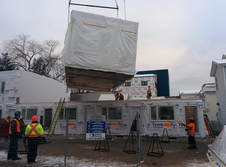 On an early morning in January, police flaggers in reflective vests blocked off what is usually very busy Fredericton street for the delivery and assembly of what would become Liberty Lane’s new home – Kenny House. Over the course of the day, the flatbed truck operator deftly reverses one Maple Leaf Home module at a time into the narrow space, manoeuvering it around trees and utility lines. A crane delicately lifts the modules off of the flatbed trucks and places them on the waiting foundation and then places the modules on top of each other. The modules are built at a plant in Fredericton and then, patiently, assembled like blocks on site until Liberty Lane’s new 10 unit home is complete. Getting to this point of building a new home for Liberty Lane was challenging. For more than 24 years Liberty Lane has offered women and their children a place to live while they tried to escape an abusive situation. The Board of Directors had been discussing a new home for several years. The demand for Liberty Lane’s services has always been greater than what they could provide and they wanted to change locations to better serve the families who need help. Their original location was away from basic things like grocery stores, doctor’s offices, and community resources. It didn’t have good bus service and it didn’t have apartments big enough for larger families. “Besides it’s actual creation in the early 1990s, Liberty Lane has never taken on a project of this magnitude,” says Executive Director Fiona Williams. “We have a wonderful board of directors but none of us had experience with a construction project. It was quite intimidating. We weren’t sure how we should proceed once we made the decision to move forward.” Fortunately, Liberty Lane’s Kenny House fundraising Patron and part of the husband and wife team for whom Kenny House is named (Kenny House is named for Joan and Bob Kenny, a well-known Fredericton lawyer who passed away from ALS in 2015), had occasion to discuss some of the challenges with the project with highly regarded community leader Bill Jones, President of Maple Leaf Homes. Eager to get any kind of guidance for the building project, Joan asked Bill a series of questions. The staff and Board Members had not known that Maple Leaf Homes could build multi-unit residential facilities, so after Joan’s discussion with Bill, Liberty Lane contacted Maple Leaf Homes sales manager, Jacques Roy. “I just wanted to talk to someone about what we could expect from the process,” said Fiona. “I didn’t realize that Maple Leaf homes could do a multilevel build on our tight building site.“ Maple Leaf Homes became one of the contractors who responded to our call for proposals. There were a number of key considerations that lead to Maple Leaf Homes getting the contract: Price, a workable timeline and the quality of the project. “There was a bit of information gathering on both sides at the beginning,” says Roy. “But that’s not unusual.” Once Fiona and I had a chance to talk about what Maple Leaf Homes could provide and the Board of Directors approved our proposal, the process moved along at the usual pace.” “It was nice having a local contact,” says Williams. “If I ever had a concern or question, Jacques or someone from Maple Leaf was there with an answer.” “It’s relatively easy to make some modification to the units,” says Roy. “The engineering is factored in and we make the changes in CAD (computer assisted design) and then build the units to the new specs.” Once the designs were finalized, the construction process began in Maple Leaf’s manufacturing plant in Fredericton. Because everything is built indoors, poor weather is not a factor and the given timelines for Liberty Lane’s delivery was on schedule. Once the units were placed, the “button up” process of sealing the exterior and installing the internal components began. This process took approximately 3 weeks. “We are so pleased with how our new units turned out at our new location,” says Fiona. “We had an unveiling at the start of the summer and the units looked beautiful. They looked fresh. And that is exactly what they are going to mean for women and their families who come to us for help – a fresh start.” Liberty Lane's Kenny House Capital Campaign grows! All of us at Liberty Lane are thankful for the community's support of our Capital Campaign. At just over the half way mark we know our total is in sight, but we can't give up yet. Funds raised will pay for our build, ensuring our programs run at full strength. The good news is that there are A LOT of ways to donate to our campaign, and A LOT of ways that we will recognize your donation (with your permission and based on your comfort level). Check out some of these options:
|
Recent News Archives
January 2020
Categories |
||||||||||||||||||||||||||||||||||||||||||||||||
General Inquiriesoffice hoursMonday - Friday, 9 am - 5 pm
Excluding Holidays |
|

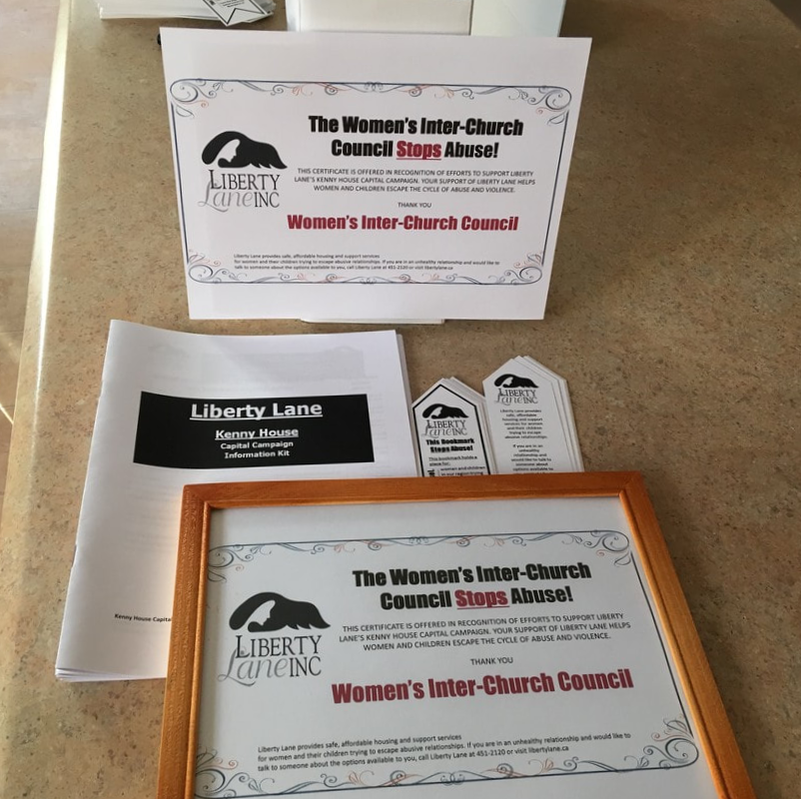

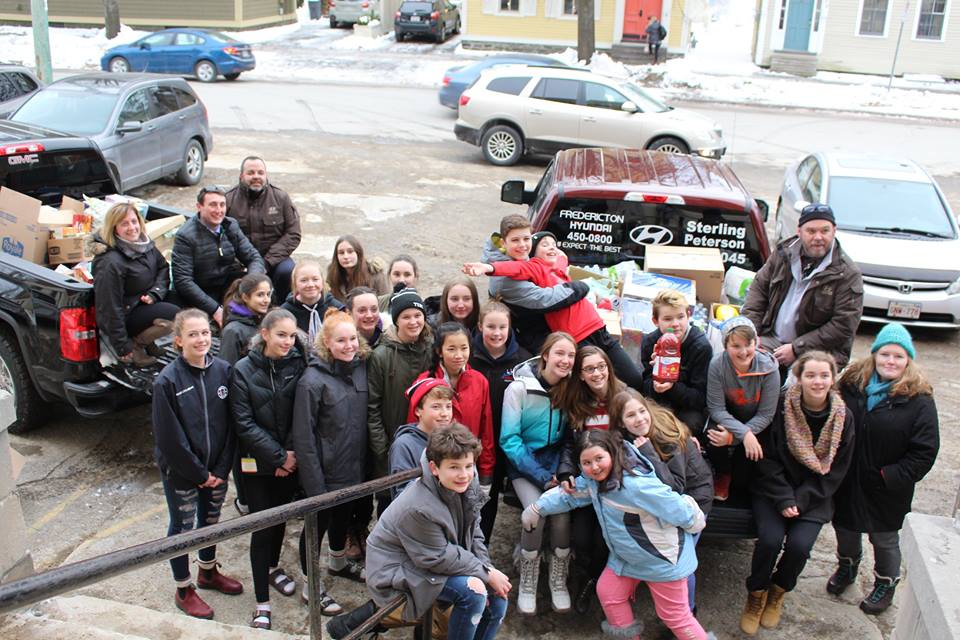
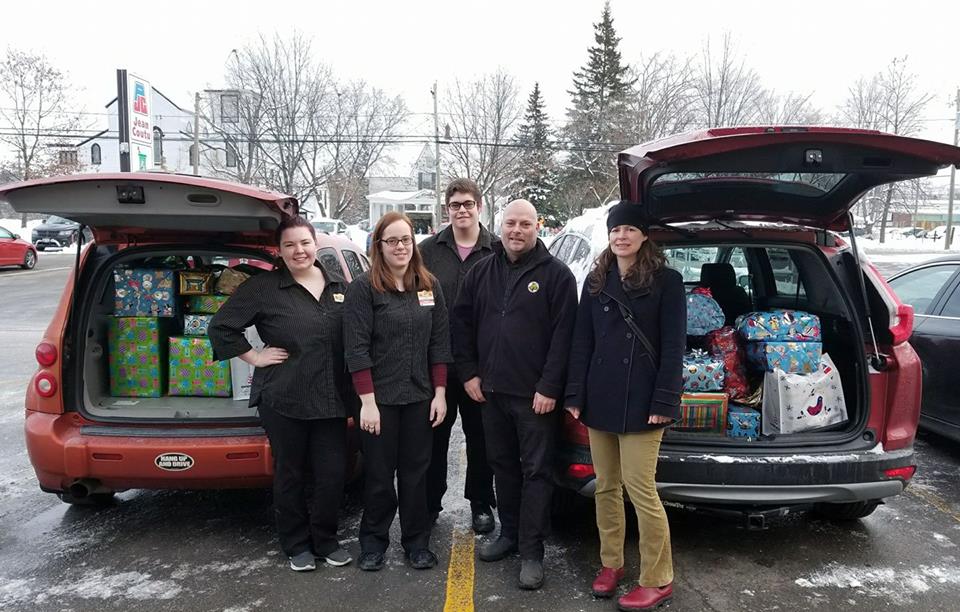

 RSS Feed
RSS Feed